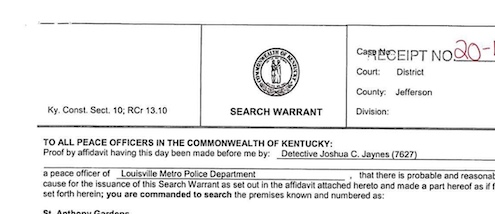Before I begin with the content of today’s article about search warrants, I’d like to take a brief moment to thank everyone for their kind words, well-wishes, support, and generous donations to the fundraiser for our daughter Ellen. She’s in a serious battle against cancer that returned just two years after beating it the first time in a different location of her body. This time the disease is here in a big way.
Ellen and her family are going through the worst times of their lives and your contributions have meant the difference in being able to purchase much-needed medicines, testing and scans, electricity, water, and food, or going without. Every single dollar has helped in some way. Having to serve as Ellen’s constant caregiver, her husband’s company let him go. As a result Ellen and her husband now survive on only $168 per week unemployment, no health insurance, and a government who denied Ellen Medicaid.
So again, I thank each of you from the bottom of my heart. I’m grateful for all you’ve done and continue to do to help Ellen.
If you’d like to contribute, here’s the link to the fundraiser.
*By the way, Denene and I made a sudden trip to North Carolina late Thursday afternoon to be with her mother who is also battling serious cancer. She’s not well at all so a few of those well-wishes sent her way, too, would be appreciated.
We’ll remain here for a few days before traveling further south to spend time with Ellen. Then we’ll head back to Denene’s mother’s for a couple of days before once again going back to Ellen’s in time to be there for her next scan and chemo.
If you’ve wondered why I’ve disappeared from here and on social media, now you know the answer. My heart and thoughts are currently with our family.
Please, take the time to visit your family members, give them a quick call, or whatever it takes to stay in touch and to create memories. Time, after all, is precious, and it waits for no one.
Now, today’s article.
Breonna Taylor: The Search Warrant
Breonna Taylor was shot and killed by police when they entered her home in congruence with a search warrant signed by a judge (yes, officers had a search warrant). The opening paragraph of the warrant included, as most search warrants begin, by stating that probable cause to search existed, and that officers were COMMANDED by the court to search a particular location named within the body of the warrant.
After a search warrant is approved and signed by a judge officers are ordered to carry out the service. Without a judge or magistrate’s signature on the paperwork there will be no warrant. More about this in a moment.
Here are the opening paragraphs of the search warrant for Breonna Taylor’s residence at 3003 Springfield Drive #4 Louisville, Ky.
“TO ALL PEACE OFFICERS IN THE COMMONWEALTH OF KENTUCKY:
Proof by affidavit having this day been made before me by: Detective Joshua C. Jaynes (7627) a peace officer of Louisville Metro Police Department, that there is probable and reasonable cause for the issuance of this Search Warrant as set out in the affidavit attached hereto and made a part hereof as if fully set forth herein; you are commanded to search the premises known and numbered as:
St. Anthony Gardens
3003 Springfield Drive #4 Louisville, KY 40214 Jefferson County Kentucky and All Surrounding Curtilage.”
The address above was that of Breonna Taylor.
In the next article I’ll describe the facts regarding the search at Breonna Taylor’s residence, and the events that took place during the service of the warrant, including the shooting. Today, though, in preparation for the discussion of the search warrant served at Taylor’s home (Part 2), I’d like to refresh your memories about search warrants and how they’re obtained by law enforcement.
A search warrant is actually the combination of three documents—an affidavit, the warrant itself, and a return of service.
Contrary to the belief of some, and to the image that’s often portrayed on television, police officers cannot enter a private residence without a warrant or permission to do so. Of course there are exceptions to every rule, but the exceptions to this one are few and far between and must be utilized only in dire emergencies. FYI—the entries and searches we see each week on many crime TV shows are, well, totally unrealistic.
Our laws demand that searches and seizures of property and people must be reasonable and based on probable cause, not mere suspicion. Actually, the 4th Amendment is specific, stating that no warrant shall issue without probable cause. Therefore, when the police need to cross the line to invade a person’s reasonable expectation of privacy they must have a properly signed search warrant in hand.
A search warrant is issued pursuant to an affidavit, a document stating each and every fact that establishes the probable cause to legally search for certain people and items. Simply put, the officer seeking a search warrant must first complete a form, a sort of application. This “application” is the affidavit and it must clearly explain the facts (probable cause) as to why permission to search a particular place, or person, should be allowed and why the officer wants/needs to go inside someone’s house without the owner’s permission, and by breaking down the front door if necessary.

Swear, Under Oath

Normally, the officer must swear (under oath) that the facts listed in the affidavit are true.
Detail to Include in the Affidavit
The description of the place to be searched must be in vivid detail, almost down to the size and color of the doorknob. (I’m exaggerating—not much, though—, but you get the idea).
The affidavit for the Breonna Taylor search warrant described the property to be searched as follows:
A multi-family, two-story apartment complex that consists of beige vinyl siding, multi colored brick, and brown shingles. The numbers “3003” are in black lettering arranged vertically on a single column ofthe apartment building. The specific apartment has a sliding glass door that opens to a small patio on the first floor of the complex. The specific apartment has a green door with a gold-plated number “4” in the top center of the front door. The apartment complex is located within St. Anthony Gardens.
Proof
If a judge or magistrate decides the evidence is proof of probable cause, they approve and sign the search warrant and hand it over to investigators for service. (Keep in mind that some courts allow electronic submissions).
When and How
- Search warrants must be served promptly. Normally, there is a three or four day rule. If officers wait longer than that time frame the search may be ruled invalid.
- In most cases, officers are required to knock and announce their presence prior to entering a residence. (Knock, knock, knock. “This is the police. I have a warrant to search this house. If you don’t open the door I’m going to huff, and puff, and—.”
Exceptions to Knock and Announce
Typically, search warrants are to be served in the daytime unless specified differently within the body of the warrant.
There are situations when warrants must be served under the cover of night.

The exceptions to the knock and announce rule (“no-knock” warrants) occur when/if the officer has good reason to believe that:
- There is a clear and present danger to himself and anyone else present, including people inside the house.
- The delay of entry would cause irreparable harm to the investigation (evidence would/could be destroyed).
- The search warrant for Breonna Taylor’s residence was a no-knock warrant approved by the judge.
The best case scenario is, of course, to knock on the door and wait for someone to answer. Not only is the knocking method the easiest, it’s by far the safest means of serving a search warrant. But, bad guys rarely play by the rules. Therefore, safety is a top concern which sometimes means no-knock entries are the best and safest method for officers.
No One’s Home But Us Chickens!

When using the knock and announce approach, if no one answers the door within a reasonable amount of time, police officers are legally permitted to damage property if that’s what is required to gain entry.
What’s a reasonable amount of time? Courts have ruled that a few seconds is considered reasonable—15 seconds or so. However, this all depends upon the circumstances at the scene. For example, when officers announce their presence and then hear sounds—people running, overturning furniture, toilets flushing, glass breaking, etc.—those actions would lead a reasonable person to believe that evidence is being destroyed and officers may enter immediately.
A Search Warrant in Hand Means Cops Can Search Everywhere, Right?
Once they’ve entered a property, officers may only search for the item(s) listed on the warrant, and they may only search in areas where those items could reasonably be found. For example, if searching for a stolen refrigerator, investigators may not open and paw through underwear and sock drawers. If the item they’re seeking is small (a piece of jewelry or drugs), then they may search from chimney top to basement floor and everywhere and everything between. That’s when they sift through the unmentionables.
Next up – Part 2, The Full Search Warrant for Breonna’s Taylor’s Home (see the document).


